Campus News
This is UCSC
News and people of note from UC Santa Cruz
Sea stars in peril

Tissue is disintegrating on two arms of this sea star affected by sea star wasting syndrome. (Photo by Melissa Miner)
|
A mysterious disease that causes sea stars to decay and fall apart within a few days became widespread along the U.S. West Coast late last year. First reported off the coast of Washington in June, the disease known as “sea star wasting syndrome” has now been observed as far north as southeast Alaska and as far south as Orange County, California.
The Pacific Rocky Intertidal Monitoring Program, led by Pete Raimondi, professor and chair of ecology and evolutionary biology, has been documenting the disease at the group’s long-term monitoring sites along the West Coast and collecting reports from other scientists and citizens.
Raimondi said citizens can help by reporting observations of the disease on his group’s Sea Star Wasting Syndrome web site.
Grateful Dead drummer pays tribute
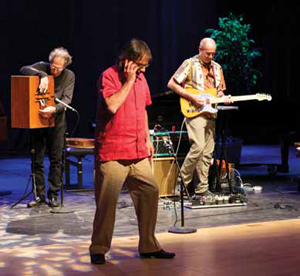
Grateful Dead drummer Mickey Hart, pretending to call late music professor Fred Lieberman during a memorial event in January.
|
Grateful Dead drummer Mickey Hart honored the late UC Santa Cruz music professor Fred Lieberman in January at a celebratory memorial event in the campus’s Music Center Recital Hall.
A lifelong researcher into the indigenous musical styles and traditions of China, Japan, Korea, Tibet, and South India, Lieberman was co-author with Hart of the book Drumming at the Edge of Magic in the mid 1990s.
Lieberman was also instrumental in helping to bring the Grateful Dead Archive to UC Santa Cruz. He passed away on May 4, 2013.
Student perspective: Game design
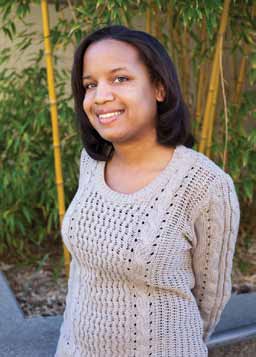
Computer science/business management economics major Lauren Scott (photo by C. Lagattuta)
|
Designing a computer game is a lot like a relationship, says Lauren Scott, a 21-year-old UC Santa Cruz student majoring in computer science and business management economics.
First, there’s the honeymoon phase when the idea seems perfect in every way. That’s followed by the rocky stage where code starts to get unwieldy and bugs emerge.
Finally, there’s the phase where the designer watches people have fun while playing her game.
That kind of risk and reward is part of what keeps Scott in a field she describes not only as a vehicle for technological change but for cultural change, as well.
Scott and two other students designed a puzzle-style computer game they called Half/Way. She also worked on UCSC’s social simulation game Prom Week and designed an economics-centered game for Sifteo cubes named Investio, among other projects.
UCSC, Hastings to offer accelerated law degree
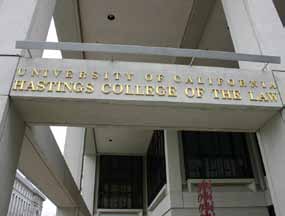 |
A new joint program, the first of its kind in the University of California system, will enable UC Santa Cruz students to earn a bachelor’s degree and law degree in six years instead of the usual seven.
The “3+3 BA/JD” Program between UCSC and UC Hastings College of the Law in San Francisco is set to accept its first applicants in the fall. UCSC students who declare their intent in their freshman or early sophomore year will complete three years at UCSC and then move on to UC Hastings to begin the three-year law curriculum.
Quasar illuminates structure of universe

This deep image shows the nebula (cyan) extending across 2 million light-years that was discovered around the bright quasar whose energetic radiation makes the surrounding intergalactic gas glow, revealing the morphology and physical properties of a cosmic web filament.
|
Astronomers have discovered a distant quasar illuminating a vast nebula of diffuse gas, revealing for the first time part of the network of filaments thought to connect galaxies in a cosmic web. UCSC researchers led the study, published in January in Nature.
“This quasar is illuminating diffuse gas on scales well beyond any we’ve seen before, giving us the first picture of extended gas between galaxies. It provides a terrific insight into the overall structure of our universe,” said coauthor J. Xavier Prochaska, UCSC professor of astronomy and astrophysics.
Device does double duty

UCSC graduate student Hanyu Wang is first author of the paper describing a novel solar microbial device (below) for generating hydrogen fuel. (Photo by Song Yang)
|
A novel device that uses only sunlight and wastewater to produce hydrogen gas could provide a sustainable energy source while improving the efficiency of wastewater treatment.
A research team led by Yat Li, associate professor of chemistry, developed the solar-microbial device and reported their results in a paper published in the American Chemical Society journal ACS Nano. The hybrid device combines a microbial fuel cell (MFC) and a type of solar cell called a photoelectrochemical cell (PEC).
In the MFC component, bacteria degrade organic matter in the wastewater, generating electricity in the process. The biologically generated electricity is delivered to the PEC component to assist the solar-powered splitting of water (electrolysis) that generates hydrogen and oxygen.
Slugs glow in Hollywood spotlight

Film director and alum Cary Fukunaga directed True Detective. (Photo by Laurie Sparham)
|
Former UCSC students are basking in the limelight.
Andy Samberg, a past Saturday Night Live cast member, picked up a 2014 Golden Globe Award for Best Actor in a TV Series Comedy for his new show, Brooklyn Nine-Nine. Samberg spent his first two years of college at UC Santa Cruz in 1996- 98, during which he worked as a ticket-taker at the old Del Mar movie theater in downtown Santa Cruz.
One of the most highly anticipated new television shows—True Detective on HBO, starring Woody Harrelson and Matthew McConaughey—was directed by alumnus Cary Fukunaga (College Eight ’99, history). Fukunaga first gained notice when he received the best “Directing, U.S. Drama” award at the 2009 Sundance Film Festival for his debut feature film Sin Nombre.
Ron Yerxa (Graduate Division ’76) and his longtime partner Albert Berger were nominated for “Best Picture” in the 2014 Academy Awards for their film Nebraska.
Fast break for success
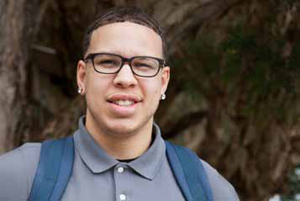
Student-athlete James Townsend, a captain of the UCSC men’s basketball squad, is shooting for a big goal. (Photo by C. Lagattuta)
|
Growing up, James Townsend didn’t have much. His father lived behind the grey walls of Folsom State Prison and his mother’s salary barely covered the expenses of raising four children. The family relied on food stamps and lived in Section 8 housing in a part of Sacramento where crime and drugs were rampant.
If statistics were to be believed, Townsend walked a narrow path between following in his father’s footsteps and the successful future his mother, Marilyn Townsend, envisioned for him. Then, as an 8th birthday present, his mother enrolled him in a Salvation Army basketball league where the young boy not only found his passion but a series of coaches who taught him about life both on and off the court.
Today, the 20-year-old Townsend is a standout basketball player at UC Santa Cruz with a 3.3 GPA and the goal of working to reform inner-city schools.
Grad student receives acclaim from Indian press

Grad student Tsering Wangmo Dhompa, whose book won acclaim from Indian press (photo by Rom Srinivasan)
|
A new book by Tsering Wangmo Dhompa—a graduate student in literature at UC Santa Cruz—was recently launched in Dharamsala, India, by the prime minister of the Tibetan government in exile.
Titled A Home in Tibet, the book is a lyrical homage to her mother—a former member of Parliament in the exiled government, who died in a car crash in India when Dhompa was 23— and to Tibet.
Following readings in Delhi and Katmandu, the book has since been garnering acclaim from major press in India.
“In A Home in Tibet, [Tsering] tries to weave a powerful tale of personal history and loss without sentimentality. In her moving narrative laced with occasional nostalgic detours, Tibet is also a main character, a land and its people who remain under subjugation,” the Hindustan Times noted.
New UC president visits campus
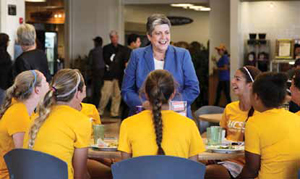
UC President Janet Napolitano talks with members of the UCSC women’s soccer team during a visit to the Cowell College dining hall. (Photo by C. Lagattuta)
|
Janet Napolitano, the new University of California president, visited UC Santa Cruz in October for two days of talks with students, staff, and faculty, and to participate in the public launch of UCSC’s first comprehensive fundraising campaign.
It was the fourth UC campus visit for Napolitano, who assumed office in September. She toured the campus, talked with students at Cowell College, heard a presentation on adaptive optics on Science Hill, and visited the Grateful Dead Archive and Special Collections at McHenry Library.
Napolitano is the 20th president of the University of California and the first woman president in UC’s 145-year history.
Grant will nurture ag education

UC Santa Cruz students work the fields in the 2013 spring Agroecology Practicum class taught by Damian Parr. (Photo by Abby Huetter)
|
UC Santa Cruz has a history of education and innovation in agroecology and organic farming that stretches over four decades, and hosts one of the oldest campus farms in the nation. A new grant from the U.S. Department of Agriculture builds on those strengths to expand opportunities for UCSC students studying sustainable agriculture, and for Central Coast junior college and high school students who might not otherwise have considered a career in agriculture.
The three-year, $730,000 grant is part of the USDA’s Higher Education Challenge program, which funds efforts to improve agricultural education in the U.S. and attract students to the agricultural sciences. UCSC will team with Cabrillo and Hartnell colleges, along with programs that serve high school students, to bring more students into four-year degree programs focused on sustainable agriculture.
JFK assassination course draws crowd
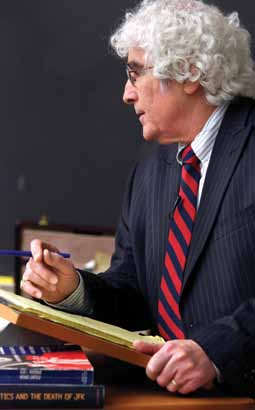
Daniel Sheehan (photo by Shmuel Thaler)
|
Many of the students in the UC Santa Cruz course about the John F. Kennedy assassination were born more than three decades after the president was gunned down in Dallas.
But interest in that tragic day remained strong on campus 50 years after the fact. The course, taught by public interest lawyer and lecturer Daniel Sheehan, was at capacity during winter quarter, with 30 undergraduates and 50 life-long learners.
Sheehan, who graduated from Harvard Law School, has a 44-year-long legal career marked by his work on such important, and controversial cases as the Watergate burglary and the Pentagon Papers in the early 1970s.
His course covers the events and circumstances of the killing, as well as various ideas, perspectives, and conspiracy theories about the murder.
Giving back to a community in need
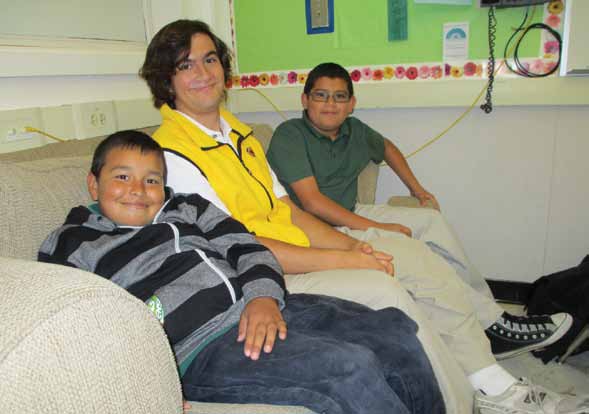
Cassidy Kakin with two students from Clyde L. Fischer Middle School, where Kakin works (photo by Peggy Townsend)
|
Cassidy Kakin strides across the blacktop at Clyde L. Fischer Middle School in East San Jose, a strong wind tousling his dark hair. He’s already met with a sullen girl who’d been disruptive in class and scheduled a stress-reducing walk with a student who was having trouble staying focused.
Now he’s zig-zagging off to talk to a boy who was causing problems in a classroom.
It’s just another day in the life of Kakin, a 2013 politics graduate from College Nine, who is spending 12 months of service with City Year, a non-profit, AmeriCorps-sponsored program that works to increase attendance and test scores in high-need schools with tutoring and mentorship help.
Kakin, 21, is one of 35 UC Santa Cruz alumni working for City Year, making UCSC the No. 4 feeder school in the nation for the program.
“It seems to be a priority of these (UCSC) students to give back to a community in need,” explains Evan Sevits, City Year’s regional recruitment manager for the West Coast. “They are very passionate about social justice and are also very action-oriented, making City Year the perfect avenue for them upon graduation.”
MLK speaker promotes dreams, values, education
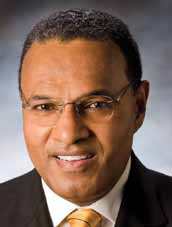
Freeman A. Hrabowski III
|
Peering into the darkened Santa Cruz Civic Auditorium, Freeman A. Hrabowski III asked that the house lights be brought up a bit so he could see the audience’s faces.
“As an old math teacher I like to see who is falling asleep,” he said.
More than 300 pairs of eyes stayed wide open for Hrabowski’s rollicking 25-minute keynote address at the 30th annual UCSC Martin Luther King Jr. Convocation in February.
Hrabowski, longtime president of the University of Maryland, Baltimore County, set the stage for his talk, “The Role of Youth in the Civil Rights Movement: Reflections on Birmingham,” with a reading based on “dreams and values.”
Sellars channels the power of art

Peter Sellars (photo by Ruth Walz)
|
Peter Sellars, one of America’s leading theater directors and an innovative figure in opera, mostly ignored the podium and steered clear of the stage during the 13th annual Maitra Lecture in December.
Instead, Sellars, whose imaginative stagings of plays and operas often reflect on war, poverty, and the voices of people left behind by history, went out into the crowd, bounding up stairs at the UCSC Music Center Recital Hall, and inviting audience members to interrupt him at any time.
A few took him up on his offer, riffing on subjects ranging from the soullessness of Ikea furniture to the commoditization of art. But Sellars touched down on serious subjects: the way art can bridge various disciplines, how art gives meaning to people’s lives, and the urgent need to hear suppressed voices, including those of prisoners.
Romero’s got game
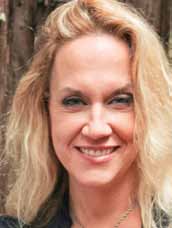
Brenda Romero (photo by C. Lagattuta)
|
Brenda Romero, program director for UCSC’s Games and Playable Media master’s degree program, was featured on a list of the “Top 10 Game Developers of 2013” from computer game news site Gamasutra.
Romero said it was “a huge surprise” to see herself on the list, which includes industry giant Nintendo and a number of small independent game studios.
Romero was also listed among 25 people who changed games in 2013 by Develop, a games industry website and magazine.
In addition, UCSC’s undergraduate and graduate game design programs were recently named among the top programs in the country by the Princeton Review. They both made the company’s “top 25” lists for 2014 of the best undergraduate and graduate schools for students to study game design.
Computer-human interaction expert wins lifetime achievement award

Steve Whittaker
|
Psychology professor Steve Whittaker, a specialist in human and computer interaction, won the 2014 Lifetime Achievement in Research Award given by the Special Interest Group on Computer-Human Interaction, a professional society for human-computer interaction researchers.
Whittaker works at the intersection of psychology and computation, using insights from cognitive and social science to design new digital tools to support effective multitasking, memory, collaboration, and socializing.
Welcoming new leadership
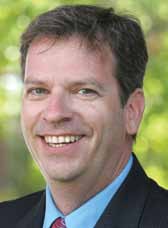 |
Keith Brant Keith E. Brant has been named vice chancellor of University Relations, which oversees fundraising, alumni relations, communications and marketing, government and community relations, operations and planning, and special events for the university.
Brant comes to UCSC from Saint Mary’s College of California in Moraga; he previously held roles at UCLA and UC San Diego. Brant will be working with Chancellor Blumenthal, faculty and academic leaders, the University Relations team, and UCSC’s alumni and friends to bring new private resources and recognition to the campus.